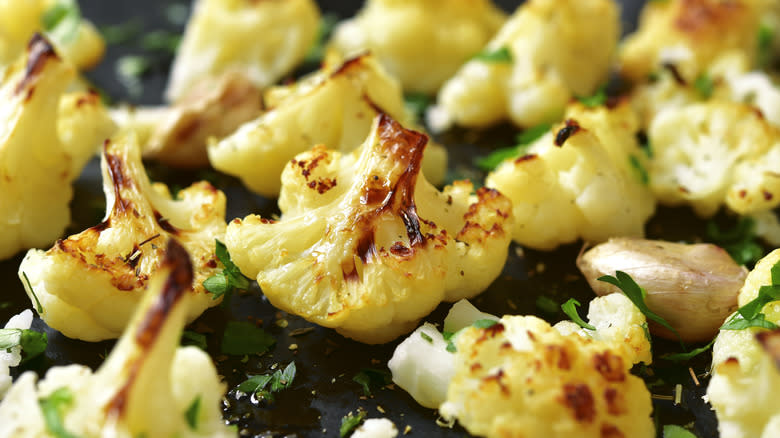Coax The Natural Sweetness Out Of Roasted Cauliflower With A Bit Of Sugar

Over the years, cauliflower has undergone numerous transformations, from rice to vegan buffalo wings to pizza crusts. While it's still a beloved steamed side dish to smother in cheese sauce, vegetable purists have found its most delicious transformation happens in the oven. Roasting cauliflower is the best way to showcase cauliflower's natural flavors while also creating a tantalizing textural contrast between its crispy browned exterior and soft tender stalks.
While a drizzle of olive oil and a sprinkling of salt and pepper will bring out cauliflower's underlying savory nuttiness, a dash of sugar coaxes out its natural sweetness. Roasting has always been prized for its capacity to caramelize the natural sugars in foods. While you might not associate cauliflower as having a sweet flavor, a bit of additional sugar enhances those rich caramelized flavors, making the most of its time in the oven. It'll also complement cauliflower's nuttiness and any other salty, savory, or spicy seasonings you plan on adding.
A mere teaspoon of sugar is all you need to make a big difference in the taste of a single head of cauliflower. Sugar, in the case of roasted cauliflower, is a flavor enhancer meant to accentuate cauliflower's taste while also balancing the robustness of other spices and the smoky, charred flavors incurred during roasting. While white sugar will highlight cauliflower's sweetness, brown sugar brings even more depth of flavor, especially when paired with other powerful spice mixtures like curry, smoked paprika, chili powder, or cayenne.
Read more: 30 Healthy Snack Ideas That Won't Ruin Your Diet
Roasting Tips For Cauliflower

Since cauliflower is a bulbous, unevenly shaped veggie, the best way to ensure even seasoning is to toss the florets in seasoned oil, as if you're tossing a salad. While olive oil delivers a wonderfully earthy complement to cauliflower's nuttiness, butter is an even richer powerhouse of flavor. You can also use a half-butter, half-olive oil mixture to get the best of both worlds.
An effective way to blend the fat with the spices is to heat it before stirring them in. Hot butter and oil will quickly melt the added sugar for a more thorough infusion with the other ingredients. One of the easiest ways to break the cauliflower down into florets is to cut the head in half, using your hands to remove the bottom, and snap the head into bite-sized florets. However, you can also roast cauliflower whole or cut it into steaks for an elegant main course. The core and leaves are edible and delicious, too!
An important tip to maximize the textures and browning is to ensure that the florets are roughly the same size and to not crowd the baking sheet. There's no need to flip cauliflower halfway through the roasting time. Smaller florets take less time than large pieces or steaks. For whole cauliflower, you can blanch it before adding the seasoned oil or glaze and sticking it into the oven.
Read the original article on Tasting Table.